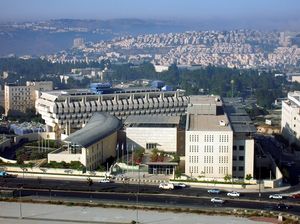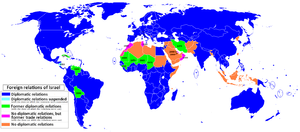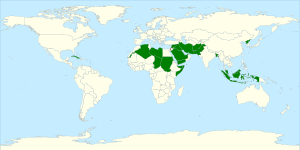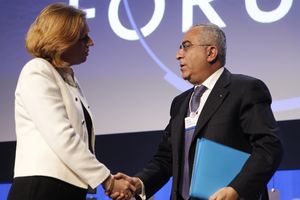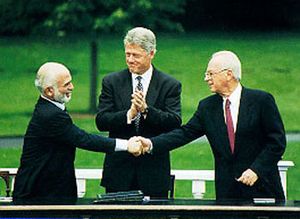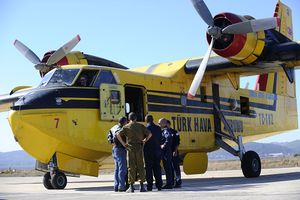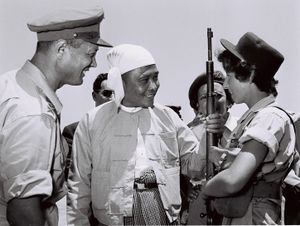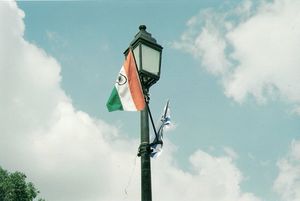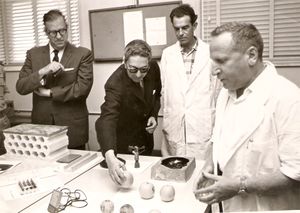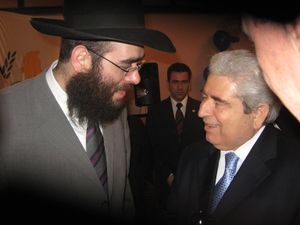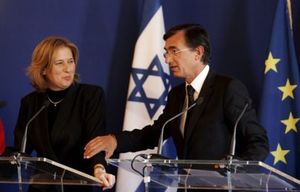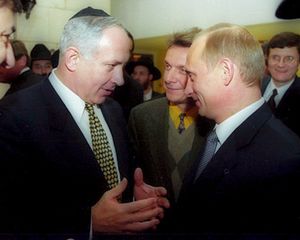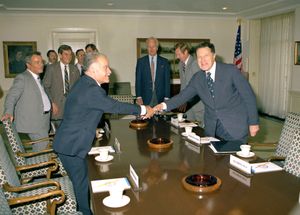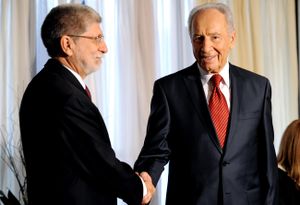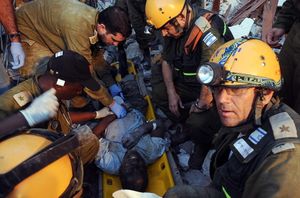العلاقات الخارجية لإسرائيل
| إسرائيل |
 هذه المقالة هي جزء من سلسلة: |
|
|
|
دول أخرى • أطلس بوابة السياسة |
العلاقات الخارجية الإسرائيلية تشير إلى العلاقات الدبلوماسية والاتفاقات الدولية بين إسرائيل والبلدان الأخرى في جميع أنحاء العالم.
انضمت إسرائيل إلى الأمم المتحدة يوم 11 مايو، 1949. إسرائيل تقيم علاقات دبلوماسية مع 157 دولة (156 من 192 الأخرى الأعضاء في الأمم المتحدة، فضلا عن الكرسي الرسولي). وقد اقامت علاقات دبلوماسية أو تجارية مع عدة دول عربية وإسلامية، رغم أن عدداً من هذه الدول قطعت هذه العلاقات الآن.
إسرائيل تقيم علاقات دبلوماسية كاملة وفتح الحدود مع الجارتين مصر والأردن منذ توقيع معاهدات سلام معهم في عام 1979 و1994 على التوالي.
العضوية في المنظمات الدولية
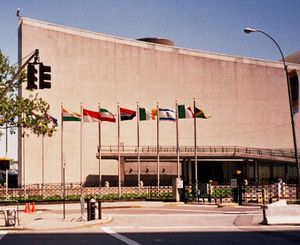
The first international organization which the Israeli government joined was the International Wheat Council, established as part of Point Four Program in early 1949. Since 11 May 1949, the State of Israel is a member the United Nations.
Israel is a member of many agencies within the UN, including the United Nations Educational, Scientific and Cultural Organization (UNESCO), the Office of the United Nations High Commissioner for Refugees (UNHCR), and the Food and Agriculture Organization (FAO). Israel also participates in other international organizations such as the International Atomic Energy Agency (IAEA) and the World Health Organization (WHO).[1]
Within the UNESCO, Israel is a member in many international programmes and organizations. In the area of science Israel is an active member of the Man and the Biosphere Programme (MAB), the Intergovernmental Oceanographic Commission (IOC), the International Hydrological Programme (IHP), the International Centre for Synchrotron-Light for Experimental Science Applications in the Middle East (SESAME), and the International Geoscience Programme (IGCP). Other notable organizations Israel is an active member of include the Education For All movement, the European Centre for Higher Education (CEPES), the World Heritage Committee (WHC), the International Centre for the Study of the Preservation and Restoration of Cultural Property (ICCROM), and the International Council on Monuments and Sites (ICOMOS).[2] Relations are carried out through the Israeli National Commission for UNESCO.[3]
Israel has joined the European Union's Framework Programmes for Research and Technological Development (FP) in 1994,[4] and is a member of the European Organization for Nuclear Research (CERN),[5] the European Molecular Biology Organization (EMBO) and the European Molecular Biology Laboratory (EMBL).[6] It is also a member of the Bank for International Settlement (BIS) since 2003.[7]
On 10 May 2010, Israel was invited to join the Organization for Economic Cooperation and Development (OECD).[8] Israel is a member of NATO's Mediterranean Dialogue forum.[9]
العلاقات الدبلوماسية
عدد الدول التي تقيم علاقات دبلوماسية مع اسرائيل في الوقت الراهن, يبلغ مائة وتسعا وخمسين دولة, من مجموع مائة وثلاث وتسعين دولة عضوا في منظمة الامم المتحدة, اضافة الى دولة الفاتيكان التي لا تنتمي الى عضوية المنظمة الدولية. وكانت آخر دولة اقامت علاقات دبلوماسية مع اسرائيل, جنوب السودان وذلك في صيف العام الماضي بعيد حصولها على الاستقلال. ويذكر ان اول دولة اعترفت بدولة اسرائيل عام 1948 كانت الولايات المتحدة, وتلاها الاتحاد السوفيتي. وفي عام 1949 تم قبول اسرائيل كعضو كامل في الأمم المتحدة, فيما بلغ عدد الدول التي اقامت علاقات دبلوماسية مع اسرائيل في نهاية العام ذاته, سبعا وأربعين دولة. وبحلول عام 1952 كانت لاثنتين وعشرين دولة, ممثليات دبلوماسية في اسرائيل, بعضها دول غربية, وفي مقدمتها الولايات المتحدة, وبريطانيا, وفرنسا, وبعضها تابعة للكتلة الشرقية, وفي مقدمتها الاتحاد السوفيتي, وتشيكوسلوفاكيا, والمجر, ويوغوسلافيا. اما الدولة الاسلامية الوحيدة التي اقامت آنذاك علاقات دبلوماسية على مستوى المفوضية مع اسرائيل, فكانت تركيا. ولكنه عقب حرب 67 , قطعت دول الكتلة الشرقية, ما عدا رومانيا, علاقاتها مع اسرائيل, فيما توترت الى حد بعيد روابط اسرائيل مع دول عدم الانحياز, التي ايدت في ذلك الحين المواقف العربية في النزاع العربي الاسرائيلي. ثم عقب حرب 73 عمدت العديد من دول افريقيا, الى قطع علاقاتها مع اسرائيل. وقد جاء هذا الاجراء تنفيذا لقرار اتخذته منظمة الوحدة الافريقية بعيد الحرب بضغط من الدول العربية, وتحت تهديد ازمة النفط , معللة قرارها هذا بان اسرائيل غزت مناطق افريقية غربي قناة السويس.[10]
وقد فتح التوقيع على معاهدة السلام بين اسرائيل ومصر عام 1979, عهدا جديدا في علاقات اسرائيل مع دول العالم, ولا سيما مع دول عدم الانحياز, التي استأنفت معظمها خلال النصف الاول من الثمانينات روابطها مع اسرائيل, ومنها زائير وكاميرون وكينيا, فيما فتح مكتب لرعاية المصالح في سريلانكا.
ومنذ اواخر الثمانينات اتسع نطاق علاقات اسرائيل الدبلوماسية مع دول العالم, عقب انتهاء الحرب الباردة بين الدولتين العظميين, وعلى خلفية مسيرة السلام بين اسرائيل والدول العربية, التي بدأت في مدريد عام 1991 . وقد مهد هذان التطوران الطريق لانشاء علاقات دبلوماسية كاملة بين اسرائيل وعدد من اهم دول العالم, وفي مقدمتها الاتحاد السوفيتي, والهند, والصين, اضافة الى سبع وثلاثين دولة من كتلة عدم الانحياز وافريقيا.
ثم بعد التوقيع على اتفاق اوسلو, مع الجانب الفلسطيني عام 93, قررت اثنتان وعشرون دولة اخرى انشاء علاقات دبلوماسية مع اسرائيل او استئنافها. بل ان هذا الاتفاق فتح الطريق أمام توسيع دائرة السلام بين اسرائيل والدول العربية. ففي اواخر عام 1994, وقعت المملكة الاردنية على اتفاقية سلام مع اسرائيل, لتعقبها في الاشهر التالية, المغرب التي اقامت علاقات دبلوماسية مع اسرائيل على مستوى مكتب لرعاية المصالح, ثم عُمان وقطر اللتان اقامتا روابط دبلوماسية مع اسرائيل على مستوى الممثلية التجارية.
وفي عام 1999 اصبحت موريتانيا الدولة العربية الثالثة بعد مصر والاردن, التي اقامت علاقات دبلوماسية كاملة مع اسرائيل. الا انه عقب نشوب احداث انتفاضة الاقصى في اواخر عام 2000, قررت كل من المغرب وتونس وعُمان قطع العلاقات مع اسرائيل, فيما عمدت قطر الى اغلاق مكتبها التجاري في اسرائيل. وفي اعقاب عملية الرصاص المصبوب في غزة عام 2009 , قطعت كل من موريتانيا وفنزويلا وبوليفيا علاقاتها مع اسرائيل, فيما قررت (نيكاراغوا) قطع علاقاتها هي الاخرى مع اسرائيل, عقب حادث سفينة (مافي مرمرة) التركية.
الدول الغير معترفة باسرائيل أو بالعلاقات الدبلوماسية
الدول الأعضاء في الأمم المتحدة
حاليا، يوجد 32 دولة عضوة في الأمم المتحدة لا تعترف كليا أو جزئيا بإسرائيل أو إقامة أي علاقات دبلوماسية معها:: 18 من أصل 22 دولة عضوة في جامعة الدول العربية: الجزائر، البحرين، جزر القمر، جيبوتي، العراق، الكويت، لبنان، ليبيا، المغرب، عمان، قطر، السعودية، الصومال، السودان، سوريا، تونس، الإمارات، واليمن.
و11 دولة أخرى عضوة في منظمة التعاون ألإسلامي:أفغانستان، بنغلادش،، تشاد، بروني، أندونيسيا، إيراني، ماليزيا، مالي، النيجر، بوتان، وباكستان، وغينيا، وشمال كوريا، وكوبا.[11]بعض الدول تقبل بالجوازات الإسرائيلية وإقرارات أخرى تعترف بالسيادة الإسرائيلية.
وفيما يلي الدول الأعضاء في الأمم المتحدة التي لا تقيم إسرائيل أي علاقات دبلوماسية معها (فترة من علاقات سابقة ملحوظة بين قوسين):
- أفريقيا:
- الجزائر; تشاد(1960–1972); جزر القمر; جيبوتي; غينيا(1959–1967); ليبيا; مالي(1960–1973); المغرب(1994–2000); موريتانيا[12] (2000–2009); Niger (1960–1973, 1996–2002); Somalia; Sudan; and Tunisia[13] (1996–2000), all of which have a Muslim majority.
- (Algeria,[14] Libya,[15] Somalia[16][17][18] and Sudan[19] do not recognise Israel.)
- Americas:
- Bolivia[20] (1950–2009); Cuba,[19][21] (1950–1973); Nicaragua[22] (1948–1982, 1992–2010) (relations currently suspended, not severed[23]); and Venezuela[24] (1950–2009).
- East Asia:
- Middle East:
- Bahrain (1996–2000); Iran (1948–1951, 1953–1979); Iraq; Kuwait; Lebanon; Oman (1996–2000); Qatar[12] (1996–2009); Saudi Arabia; Syria; United Arab Emirates; and Yemen.
- (Iran,[27] Iraq,[28] Kuwait,[19] Lebanon,[19] Saudi Arabia,[19] Syria,[19][29] United Arab Emirates,[30] and Yemen[19] do not recognise Israel.)
- South and Central Asia:
- Afghanistan; Bangladesh; Bhutan (which has diplomatic relations with only 25 countries[31]); and Pakistan.
- (Afghanistan,[32] Bangladesh,[33] and Pakistan[19] do not recognise Israel as a state.)
- Southeast Asia:
الدول غير الأعضاء في الأمم المتحدة
إسرائيل ليس لديها علاقات دبلوماسية مع الدول التالية:
- جمهورية الصين (تايوان)، وهي تعترف باسرائيل، ولكن ليس لديها علاقات رسمية مع إسرائيل (إلا أنه هناك علاقة ودية) بسبب اعتراف إسرائيل بجمهورية الصين الشعبية.
أبخازيا، كوسوڤو، ناگورنو-قرةباخ، شمال قبرص التركية، دولة فلسطين، الجمهورية الصحراوية (التي لا تعترف بإسرائيل كدولة)، أرض الصومال، اوستيا الجنوبية، وترانسنيستريا. (إسرائيل لم تعترف باستقلال أي من هذه الكيانات.)
الاعتراف الجزئي
شمال أفريقيا والشرق الأوسط
الجزائر
البحرين
مصر
إيران
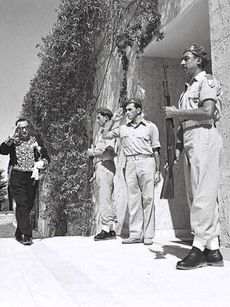
العراق
الأكراد
الأردن
الكويت
لبنان
المغرب
قطر
السعودية
جنوب السودان
سوريا
تونس
تركيا
الإمارات
اليمن
أفريقيا
أنگولا
بتسوانا
كاميرون
جيبوتي
أرتيريا
إثيوپيا
غانا
كينيا
لسوتو
ملاوي
موريتانيا
ناميبيا
النيجر
نيجيريا
رواندا
Senegal
Relations with Senegal were established soon following independence of the African state. They were broken by the government of Senegal on 28 October 1973, following the Yom Kippur war.[35] In a trilateral partnership between Israel, Italy and Senegal, Israeli drip irrigation systems are being installed to help farmers in 12 districts of rural Senegal.[36]
South Africa
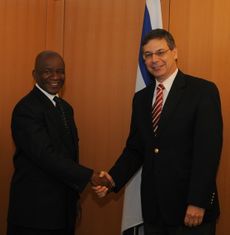
The Union of South Africa was one of only four Commonwealth nations to vote in favour of the 1947 UN partition resolution, which led to the establishment of the State of Israel. South Africa was one of the first states to recognize Israel; diplomatic relations between Israel and South Africa were established in 1948. After the Sharpeville massacre of 1960, Israel became a harsh critic of apartheid, leading to a break in its relations with Pretoria. After 1967, Israel and South Africa became strategic partners again, and this lasted until 1987 when Israel joined the West in forcefully opposing apartheid.
Since the end of apartheid, South Africa's new government has been cold toward Israel and critical of Israel's policies towards Palestinians but has nevertheless ignored calls from pro-Palestinian South African groups to sever relations between the two countries.
Swaziland
Israel established diplomatic relations with Swaziland in September 1968,[13] immediately following that country achieving independence from the United Kingdom. Swaziland was one of only three Sub-Saharan black African states (the others being Lesotho and Malawi) that continued to maintain full diplomatic relations with Israel in the aftermath of the Yom Kippur War in 1973, and has never severed such ties.[37]
Togo
In May 2009, Israel and Togo signed a "pact for cooperation in the economic, agricultural and educational fields" with each other.[38]
Uganda
In a joint Israeli-Ugandan project, a professor from the Hebrew University of Jerusalem's Faculty of Agriculture conducted a survey of Lake Victoria with a Ugandan colleague from Makerere University. They found that Nile perch, introduced by the British sixty years ago, have decimated native fish populations, leading to malnutrition in the lakeside communities.[39] She helped to set up artificial fish ponds to raise carp, which had disappeared from the local diet. The United States Agency for International Development sponsored the digging of the ponds and sent villagers to Kibbutz HaMa'apil in Emek Hefer to learn spawning techniques. Graduates of the training program established carp farms.[39]
Zimbabwe
Abel Muzorewa, the Prime Minister of Zimbabwe Rhodesia, visited Israel on 21 October 1983. He urged Robert Mugabe to establish diplomatic relations, saying his political policies hurt Zimbabwe's agriculture and technology industries. In March 2002 an Israeli company sold riot control vehicles to the Mugabe government, shortly before the nation's 2002 elections.[40]
Asia
In addition to Turkey, Israel has diplomatic relations with 6 non-Arab Muslim states in Asia (Kazakhstan, Kyrgyzstan, Maldives, Tajikistan, Turkmenistan and Uzbekistan).
Afghanistan
Despite being a close ally of the United States and India, Afghanistan has no relations with Israel and has condemned its existence several times. Along with neighboring ally Iran, Afghanistan considers Israel an enemy state. In the wake of the 2008–2009 Gaza conflict, 50,000 Afghans signed up in Kabul as a symbolic gesture to fight the Israelis.[41] Chants of "death to Israel" rang through the streets of the Afghan capital Kabul for a week.[41] Many Afghans lined up to donate blood to Palestinians.[41] In January 2009, Afghan President Hamid Karzai and his Iranian counterpart Mahmoud Ahmadinejad called Israel's invasion of Gaza a massacre "barbaric and inhumane and widely helped by the Americans".[41]
Bangladesh
Bangladesh does not recognize Israel as legitimate and officially forbids its citizens to travel to Israel by putting "Valid for travel to all countries except Israel" on Bangladeshi passports. Bangladesh follows the same policy as other Muslim states, supporting an independent Palestinian state and the destruction of Israel. Because there is an absence of ties, there are no economic relations between the two states and Bangladesh has a complete ban on Israel, ranging from travel, trade (direct and indirect) and other sectors of bilateral relations.
Burma
Burma (otherwise known as Myanmar) was one of the first countries to recognize Israel and establish diplomatic relations with Israel. Burma has also become one of Israel's strongest allies in the region, in terms of both technical assistance and also the much debated and rumored military links. Premiers from both sides such as U Nu and David Ben-Gurion made state visits to each other's countries in the 1950s.[42][43] Burma sends agriculture researchers to Israel for training. This was further cemented in Israel's aid assistance during the Cyclone Nargis disaster of May 2008.
China
On 9 January 1950, the Israeli government extended recognition to the People's Republic of China, but diplomatic relations were not established until January 1992.
Israel has provided China with technological assistance in the areas of advanced agriculture and irrigation. Bilateral R&D projects, supported by the China-Israel Agricultural Research Fund, are focused on the development of new varieties of fruit and vegetables, agricultural biotechnology and applying modern technologies for processing fresh produce. Israel has built three major demonstration farms in China and several training centers which are supported by both Chinese and Israeli ministries of agriculture.
Israel has also provided China with military assistance, expertise and technology. According to a report from the United States-China Economic and Security Review Commission, "Israel ranks second only to Russia as a weapons system provider to China and as a conduit for sophisticated military technology, followed by France and Germany." Israel was ready to sell China the Phalcon, an Israeli airborne early-warning radar system (AWACS), until the United States forced it to cancel the deal.[44][45]
Since the establishment of diplomatic relations, cultural exchange has been a major component of the bilateral relations, as both sides recognise the importance of creating a strong foundation based on their ancient and rich histories.[46] In 2007, China launched a countrywide Festival of Culture in Israel to mark 15 years of relations.[47]
India
India established diplomatic relations with the State of Israel in 1992 and has since become Israel's strongest ally in Asia.[48][49] The two countries cooperate in anti-terrorist activities in the Middle East and Southern Asia. Israel is India's largest arms provider and India is Israel's principal arms market, and the trade volume between the two countries has increased significantly in the past few years.[50] Co-operation has taken place in the space sector as well with India launching Israeli satellites. India became the top source market for Israel from Asia in 2010 with 41,000 tourist arrivals in that year.[51]
Israel and India share intelligence on terrorist groups. They have developed close defense and security ties since establishing diplomatic relations in 1991. In 2009, Israel overtook Russia as India's biggest arms supplier; the U.S. even gave Israel approval to sell the Phalcon to India after earlier forcing Jerusalem to cancel a similar deal with China. India has bought more than $5 billion worth of Israeli equipment since 2002. In addition, Israel is training Indian military units and discussing an arrangement to give Indian commandos instruction in counter-terrorist tactics and urban warfare.[52] In December 2008, Israel and India signed a memorandum to set up an Indo-Israel Legal Colloquium to facilitate discussions and exchange programs between judges and jurists of the two countries. According to an international opinion survey conducted in 2009 on behalf of the Israeli Foreign Ministry, India is the most pro-Israel country in the world.[53][54] While two sizable minorities in Indian life—the Indian Muslim population and the Socialist/Communist political groups—disdain New Delhi's ties to Israel, they have repeatedly failed to change them.
Indonesia
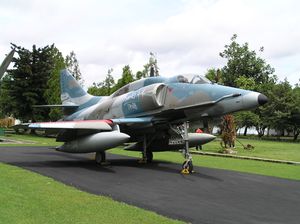
In 2012, Indonesia agreed to informally upgrade its relations with Israel and to open a consulate in Ramallah, headed by a diplomat with the rank of ambassador, who will also unofficially serve as his country’s ambassador for contacts with Israel. The move, which was agreed upon after five years of sensitive deliberations, represents a de facto upgrading of relations between Israel and the world’s most populous Muslim country. Indonesia has formally presented the move to open a West Bank consulate as a demonstration of its support for Palestinian independence. In fact, while the ambassador-ranked diplomat will be accredited to the Palestinian Authority/PLO, a significant portion of his work will be in dealings with Israel, and the office will fulfill substantial diplomatic duties as well as consular responsibilities. Israel and Indonesia quietly maintain trade, security and other relations. Israelis can get visas for Bali in Singapore, while many Indonesians come to Israel as pilgrims. [56]
Japan
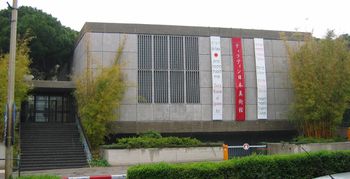
On 15 May 1952, diplomatic relations were established with Japan at a Legation level. However, the Japanese government refrained from appointing a Minister Plenipotentiary to Israel until 1955. Relations between the two states were distant at first, but after 1958, no break occurred, despite the Arab oil embargo on several countries, including Japan.
Kazakhstan
Both countries established diplomatic relations on 10 April 1992. The embassy of Israel in Kazakhstan opened in August 1992. The embassy of Kazakhstan in Israel opened in May 1996. Israel has an embassy in Astana and Kazakhstan maintains an embassy in Tel Aviv.
Malaysia
Israel and Malaysia do not maintain diplomatic relations, but have thriving trade relations.
Maldives
Relations between Israel and Maldives were not very strong until the new government of the Maldives came into power in 2008. From 1978 to 2008 there were no official relations between Israel and the Maldives. The president of Maldives, Mohamed Nasheed announced that he would like to establish diplomatic relations with Israel. In September 2009, Maldives restored diplomatic relations with Israel, 15 years after suspending them.[57]
Nepal
Israel-Nepal relations, first established in 1960, are based on mutual security concerns.[58] Bishweshwar Prasad Koirala, Prime Minister of Nepal from 1959 to 1960, had a strongly pro-Israel foreign policy. King Mahendra visited Israel in 1963 and maintained Koirala's special relationship.[59]
North Korea
North Korea does not recognise the state of Israel, denouncing it as an "imperialist satellite".[26] Since 1988 it recognises the sovereignty of the State of Palestine over the territory held by Israel.
Pakistan
Israel and Pakistan do not have diplomatic relations with each other, and Pakistan forbids its citizens from going to Israel by putting the legend 'This passport is valid for all countries of the World except Israel' on Pakistani passports.[60][61][62] Some Israeli leaders have expressed the belief that should diplomatic relations with Pakistan be established, then Pakistan could serve as a bridge between Israel and the Muslim world.[63] In 2008, the Israeli Foreign minister stated that "Israel considers Pakistan as its biggest strategic threat" in light of concern over the increasing Taliban threat in Pakistan.[64]
Philippines
On 29 November 1947, the Philippines (a U.S. territory until 1946) was the only Asian nation to support the partition resolution at the United Nations General Assembly recommending a Jewish State in Palestine.[65] Israel and the Philippines established full diplomatic relationships in 1957. Embassies were opened in Tel-Aviv and Manila in 1962. The two countries have enjoyed warm relations in all spheres. In 1997, the two countries signed a Memorandum of Understanding (MOU) institutionalizing the bilateral political dialogue between the respective foreign ministries. The political dialog is accompanied by cooperation in trade and economy, culture, technical assistance, science, academic exchanges, tourism etc. There are between 37,155–50,000 Filipino workers in Israel as of 2004.[66][67]
Singapore
Singapore and Israel have strong bilateral ties and have enjoyed close relations from the outset. This is in part due to both countries' perceptions of themselves as regional economic powerhouses surrounded by much larger Islamic countries with which they have an uneasy relationship. Following Singapore's sudden and unexpected independence after being unilaterally ejected from Malaysia, Singapore appealed to the international community for technical assistance and military aid. Israel sent over a mission to jumpstart Singapore's economy and create, from scratch, Singapore's armed forces and its Ministry of Defence (MINDEF), the former modeled after the IDF in both doctrine and order of battle.[بحاجة لمصدر]
Today both countries have extensive economic ties and engage in a high volume of trade, with an emphasis on technology and research and development in the spheres of bio-technology and defense. Israel's national airline El Al does not fly to Singapore as Singapore is located in the region of Indonesia and Malaysia both of which do not recognise Israel as a state which makes attaining flight rights impossible. Israel has had diplomatic representation in Singapore since its earliest days, with representation formalised in 1968. Singapore is a regional hub for Israeli businesses, while a growing number of members of both business communities seek opportunities for joint ventures in biotechnology, IT and the software industries. Several bilateral agreements provide a solid framework for cooperation in areas such as healthcare, defence, and technological research & development. Most recently, in 1997, a bi-national fund for financing new technological products was set up, an indicator of deepening bilateral relations between both states. Cultural exchanges have been accentuated by encouraging the participation of Israeli artists in international events in Singapore, cultivating a broad interest in Israeli performing arts. The yearly Film Festival has grown to become a cornerstone in the structured framework of activities.[68]
South Korea
The Republic of Korea and the State of Israel established diplomatic relations on 10 April 1962.[69][70] Israel opened its embassy in Seoul in April 1968, which was closed by the Israeli government in February 1972. The embassy was reopened in January 1992, with Korea opening its resident embassy in Tel Aviv in December 1993.[69]
On 23 August 2010 Korea Venture Investment Corp. (KVIC), a state-backed fund management company, signed a memorandum of understanding with Israel's Vertex Venture Capital (VVC) to raise a US$150 million fund, which will be used to finance joint ventures or the merger and acquisition of small and mid-size venture firms in the two countries.[71]
Sri Lanka
In May 2011, the Israeli Minister of Agriculture visited Sri Lanka with an agro-business delegation to promote cooperation between the two countries.[72]
Thailand
Thailand and Israel have had full diplomatic relations since 23 June 1954. The Israeli embassy was opened in 1958 although the Thai embassy in Tel Aviv only opened in 1996. Since the beginning, both countries have enjoyed strong ties and beneficial bilateral cooperation in many fields, most notably in agriculture and education. Thousands of Thai academics have been sent to train in Israel while many Thai schools have been modeled after Israel's experience and know-how with aid from Mashav. State visits by Thai royalty to Israel have been reciprocated by Israel's public figures. 100,000 Israeli tourists visit Thailand annually.[73] Thousands of skilled and unskilled Thai workers are employed in Israel and many Thai students study in Israel.
There is also a Thai-Israel Chamber of Commerce, Thai-Israel Friendship Foundation as well as a small community of Israelis living in Thailand.[74]
Turkmenistan
In 2009, the Israel Foreign Ministry announced the opening of a new embassy in Ashgabat, Turkmenistan.[75]
Vietnam
Vietnam and Israel established diplomatic relations on 12 July 1993. Israel opened its resident Embassy in Hanoi in December 1993.[76] The first Vietnamese ambassador to Israel presented his credentials on 8 July 2009.[77] Since the establishment of diplomatic relations, the two countries have frequently conducted reciprocal visits at various levels, and have strengthened ties in such fields as business, education, culture, technological cooperation and agriculture. The visits arranged by the Israeli government included those of delegations comprising entrepreneurs and businessmen, academic groups, journalists, artists and musicians, legal workers, and so on.[78]
Europe
Albania
Israel and Albania established diplomatic relations on 20 August 1991. Albania had previously recognized Israel as a state since 1949.[79] Albania has an embassy in Tel-Aviv and Israel also has an embassy in Tirana.
Armenia
Since independence, Armenia has received support from Israel and today remains one of its major trade partners. While both countries have diplomatic relations, neither maintains an embassy in the other country. Instead, Ehud Moshe Eytam, the Israeli ambassador to Armenia is based in Tbilisi, Georgia, and visits the capital Yerevan twice a month. Israel has recognized 10 Armenians as Righteous Among the Nations for risking their lives to save Jews during the Holocaust.[80]
Austria
Austria recognized Israel on 5 March 1949. Austria has an embassy in Tel Aviv and 3 honorary consulates (in Eilat, Haifa and Jerusalem).[81] Israel has an embassy in Vienna.[82] Both countries are full members of the Union for the Mediterranean. The Austrian Foreign Ministry lists the bilateral treaties with Israel (in German only).[83]
Azerbaijan
Azerbaijani-Israeli relations are good, and Israel has an embassy in Baku. In May 1999, the U.S.-Azerbaijan Council sponsored a seminar to discuss relations among Azeris, Jews, and Israel. In April 2000, an Israeli trade delegation visited Baku to discuss ways of strengthening bilateral economic relations.
Many Azerbaijanis express the hope that friendship with Israel may help to resolve the Nagorno-Karabakh dispute and expedite Azerbaijan's integration with the West.[بحاجة لمصدر] The Azerbaijan-Israel Friendship Society facilitates and promotes bilateral diplomatic and business links. In October 2001, President Aliyev pledged to open an embassy in Israel and send his Foreign Minister to visit the country. Although neither has occurred, Azerbaijani-Israeli strategic cooperation continues to grow.
For many years, Azerbaijan has maintained high rates of immigration to Israel due to the economic and political situation in the country. In 2002, 475 Jews made aliyah and 111 immigrated to the United States. The Azeri government gets regular updates from Israel regarding Azeri Jews in Israel, who are plagued by unemployment, crime, and other social issues as new immigrants in Israel.[84]
Belgium
Bulgaria
Israel and Bulgaria share a special relationship. Bulgaria was one of the rare countries in Europe which saved its 48,000 Jews during the WWII.[85] Israel and Bulgaria established diplomatic relations in 1948. After the Six-Day War Bulgaria cut diplomatic ties with Israel. In 1990 diplomatic relations were renewed. Bulgaria has an embassy in Tel Aviv and Israel has an embassy in Sofia and honorary consul in Varna.[86]
Croatia
Israel and Croatia established diplomatic relations on 9 April 1997. Croatia has an embassy in Tel Aviv and 4 honorary consulates (in Ashdod, Caesarea, Jerusalem and Kfar Shmaryahu). Israel has an embassy in Zagreb.
Cyprus
Israel has had diplomatic relations with Cyprus since Israel's independence in 1948, when Cyprus was a British protectorate. Israel and Cyprus’ associations have continued to expand since 1960, the year of Cyprus’ independence. The neighboring countries trade regularly and there are high flows of tourism between them. However, Cypriot politicians have frequently spoken out against Israeli military raids in the Palestinian territories as well as the 2006 Lebanon War, during which Cyprus was forced to manage a heavy flow of refugees and aid out of and into Lebanon.[87]
However, the discovery of natural gas in the Leviathan gas field led to a thawing of relations between the two governments. The two countries demarcated their Exclusive Economic Zones in 2010. Israel's rising antagonism with Turkey further increased the level of cooperation between the two countries, as Israel compensated by improving its relations elsewhere. In February 2012, Netanyahu visited Cyprus, the first visit of an Israeli Prime Minister in history.[88] The collaboration between Cyprus,Israel and Greece on natural gas extraction has been characterised by the media as the Energy Triangle.
Cyprus serves an important role as the place where most Israeli couples obtain civil marriages, because Cyprus is the closest country on good diplomatic terms with Israel that issues civil marriages. Israel does not issue civil marriages, only religious ones, with religious restrictions on the eligibility of marriage, and a recent law allows civil marriages in Israel under one condition: both individuals are non-Jewish residents of the state. Israel does however recognize civil marriages issued abroad, with Cyprus being the largest source of easy civil marriage licenses.
Relations between Israel and Cyprus are based on mutual respect for Western values, the support for free-market economy and the establishment of democracies in the Middle East that would co-exist peacefully.[89]
Czech Republic
Israel and the Czech Republic share a special relationship. Czechoslovakia was the only country to send aid to Israel in its early years e.g. arms shipments from Czechoslovakia to Israel 1947–1949.
In December 2008, the Czech Air Force wanted to train in desert conditions for the upcoming mission in Afghanistan. No country agreed to help, except Israel. Israel saw it as an opportunity to thank the Czechs for training Israeli pilots when the country was first established.[90]
Denmark
The relations between Denmark and Israel have been friendly and warm.
Finland
In 2004, a joint Finland-Israel Technology (FIT) cooperation program was created for research and development projects in the field of ICT. The Office of the Chief Scientist in Israel and Tekes, the Finnish Funding Agency for Research and Innovation, allocated five million euros each for the funding of projects.[91] In 2005, Finnish exports to Israel totaled 155,24 million euros and imports from Israel to Finland totaled 95,96 million euros. IFinland's leading exports to Israel are telecommunications equipment and machinery, and Israeli fruits and vegetables.[91]
France
In the early 1950s, France and Israel maintained close political and military ties as common enemies of Pan-Arab nationalism. France was Israel's main weapons supplier until its withdrawal from Algeria in 1962 removed most common interest from the relationship, and France became increasingly critical of Israel.[92] This new reality became clear when, in the crisis leading up to the Six-Day War in June 1967, Charles de Gaulle's government imposed an arms embargo on the region, mostly affecting Israel, which had relied on France for weapons over the previous decade.[93] Under François Mitterrand in the early 1980s, French-Israeli relations improved greatly. Mitterrand was the first French president to visit Israel while in office.[94] In 1967, after the Six Day War, 5,300 French Jews immigrated to Israel.[95]
Georgia
Relations between Israel and Georgia are currently relatively close.[96] Georgia's former defense minister from 2006 to 2008, Davit Kezerashvili, had previously lived in Israel. Israel has been selling weapons to Georgia for seven years financed by grants from the USA[96] Included in these weapons are Israeli-built spy drones provided through the former mayor of Tel Aviv, Roni Milo. Israeli advisors, estimated to number between 100 to 1,000, have trained the Georgian military for some time.[96]
Germany
Due to its role in the Holocaust, Israel was at first extremely hostile towards Germany and initially refused to establish relations with them. However, relations gradually thawed as Germany offered to pay reparations in 1952, and diplomatic relations were officially established in 1965. Israel and Germany now maintain a "special relationship" based on shared beliefs, Western values and a combination of historical perspectives.[97] Among the most important factors in their relations is Nazi Germany's role in the genocide of 6 million Jews during the Holocaust.[98]
Germany is a prime supplier of arms to Israel, including Dolphin submarines. The military co-operation has been discreet but mutually profitable: Israeli intelligence, for example, sent captured Warsaw Pact armor to West Germany to be analyzed. The results aided the German development of an anti-tank system.[99]
Greece
Both Greece and Turkey recognized the State of Israel in the late 1940s, but were diplomatically represented in Tel Aviv on lower-than-embassy levels. Greek-Israeli relations improved in 1995. Trade doubled between 1989 and 1995. That year Israel exported $200 million worth of chemicals and oil products to Greece and imported $150 million worth of cement, food, and building materials. Israel is the second largest importer of Greek products in the Middle East.
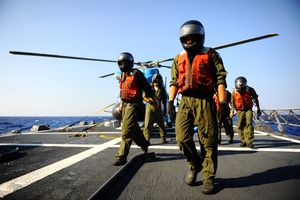
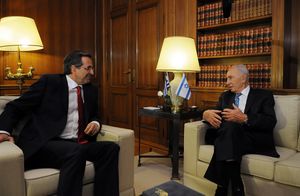
A Greek-Israeli cooperation agreement on military affairs was concluded as early as December 1994 (predating the Turkish-Israeli agreement of February 1996); however, both sides refrained from activating the agreement. Greece was apparently concerned about alienating the Arab world while Israel did not wish to upset the Turks. Greece and Israel agreed to hold joint naval maneuvers at the end of the summer 1997, but they were indefinitely postponed by the Greeks. The reason given for the postponement was that the Greek navy was busy preventing infiltrations from Albania, and it could not spare a frigate for the exercises.[100]
Greece-Israel relations improved as Turkish-Israel relations worsened in the aftermath of the 2010 Gaza flotilla raid. In October 2010, the Israeli and Greek air-forces trained jointly in Greece. According to the BBC, this signified a boost in ties that was due in large part to Israel's rift with Turkey.[101] In November 2011, the Israeli Air Force hosted Greece’s Hellenic Air Force in a joint exercise at the Uvda base.[102]
The joint Cyprus-Israel oil and gas explorations are also an important factor for Greece, given its strong links with Cyprus.[103] Additionally Greek and Israeli state controlled energy companies are planning to lay the world's longest subsea power cable, linking Israel, Cyprus and Greece by 2015. The link, called the EuroAsia Interconnector project, would be the longest in the world.[104]
A new joint action committee for the Greek-Israeli alliance has been created in the U.S. Congress in early 2013. The creation and goals of the Greek-Israeli Caucus under the name Congressional Hellenic-Israel Alliance were announced at a special event held in the Congress.[105] It is co-chaired by Congress members Gus Bilirakis the Republican representative from Florida and Ted Deutch the Democrat from Florida, and the Greek-Israeli Caucus consists of powerful members of both Republican and Democratic party. It is estimated that it may become the most important pressure group in Congress by 2014.[106][107][108]
Holy See
Before the establishment of the State of Israel in 1948, the Vatican opposed Zionist policies and objectives in Palestine. In 1947, during discussions at the United Nations about the United Nations Partition Plan for Palestine, the Vatican supported the internationalization of Jerusalem, in order to keep the holy places away from either Israeli or Arab sovereignty. In October 1948, as the 1948 Arab–Israeli War was in progress, Pope Pius XII, deeply disturbed by that violent conflict, issued the encyclical "In Multiplicibus Curis", in which he called on the peace-makers to give Jerusalem and its outskirts "an international character" and to assure – "with international guarantees" – freedom of access and worship at the holy places scattered throughout Palestine. In April 1949, he issued the encyclical "Redemptoris Nostri Cruciatus", in which he appealed for justice for the Palestinian refugees and repeated his call for an "international status" as the best form of protection for the holy places.
In January 1964, Pope Paul VI visited Israel, the first such Papal visit.
Following the Six Day War, the Vatican modified its position on the holy places. In an address to the College of Cardinals in December 1967, Pope Paul VI called for a "special statute, internationally guaranteed" for Jerusalem and the Holy Places, thus changing the previous demand for the internationalization of Jerusalem.
Diplomatic relations between the Israeli government and the Vatican were established in 1994, following the conclusion of the Fundamental Agreement between the Holy See and the State of Israel, signed on 30 December 1993. The Holy See (the Vatican), which has UN observer status, is the only non-UN member state with which Israel has diplomatic relations and the only non-UN member state recognised by Israel. An important organ in these relations is the Israel-Vatican Bilateral Commission, established under article 10 of the Agreement to resolve economic issues between the parties.
In March 2000, Pope John Paul II visited Israel. In May 2009, Pope Benedict XVI held an official visit to Israel.
The bilateral commission convened on 30 April 2009 and 10 December 2009.[109]
Ireland
Full diplomatic relations between Ireland and Israel were established in 1975.[110] In 2006, the Israeli ambassador to Ireland was Zion Evrony,[111] and the Irish ambassador to Israel was Michael Forbes.[112]
The Irish government followed a similar line to other EU governments during the 2006 Israel-Lebanon conflict, with the Irish Taoiseach, Bertie Ahern, condemning the actions of Israel as "reckless and disproportionate" and calling for an immediate ceasefire on both sides, while also condemning the actions of Hezbollah.[113] During the conflict, a shipment of bombs that attempted to land in Ireland from USA to Tel Aviv was denied use of Irish airspace and airfields by the Irish Government. The weapons were part of a series of agreed arms shipments between the United States Government and Israel. The shipments were diverted via Scotland, where they also caused controversy.[114]
In 2010, the Israel Defense Forces forcibly boarded an Irish aid ship destined for the Gaza Strip which resulted in worsened relations, Israel's Mossad was also involved in the counterfeiting of Irish passports, 2 members of the Israeli ambassador's security staff in Dublin were subsequently deported. In 2010, there were numerous protests at the Israeli embassy in Ireland over the treatment of Palestinians.
Italy
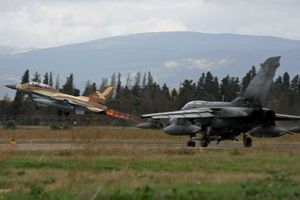
Relations between Italy and Israel remain strong, with frequent diplomatic exchanges and a large volume of trade. The Israeli Government has followed with great attention the fight against international terrorism pursued by the Italian Government.
Luxembourg
In November 1947, Luxembourg voted in favor of the partition plan to create a Jewish state. Israel and Luxembourg established full diplomatic relations in 1949. Due to Luxembourg's small size, the Israeli embassy is located in Brussels and Luxembourg is represented politically by the Dutch embassy and economically by the Belgian embassy.[115]
Macedonia
Netherlands
In 1947, the Netherlands voted in favor of the establishing Israel and established diplomatic relation in 1949. Israel has an embassy in The Hague and The Netherlands has an embassy in Tel Aviv.
Norway
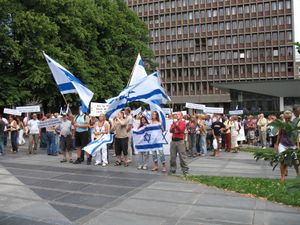
Norway was one of the first countries to recognize Israel on 4 February 1949. Both countries established diplomatic relations later that year. Israel has an embassy which serves Norway and Iceland in Oslo. Norway has an embassy in Tel Aviv and 2 honorary consulates (in Eilat and Haifa). Israels Venner på Stortinget (Friends of Israel in the Parliament of Norway) is a pro-Israel caucus group consisting of members of the Parliament of Norway (Stortinget).
Poland
Following the severing of relations after the Six-Day War, Poland was the first Eastern bloc country to again recognize Israel in 1986. Full diplomatic relations were reestablished in 1990, after the communist People's Republic of Poland became modern, democratic Poland.
Portugal
Since 1959 Israel and Portugal were represented by Consulates General only. Full diplomatic relations with the Portuguese government were established in 1977, following the Portuguese revolution of 1974.[116]
Romania
Russia and the Soviet Union
The الاتحاد السوڤيتي voted in favor of the United Nations Partition Plan for Palestine in 1947, which paved the way for the creation of the State of Israel. On 17 May 1948, on the third day of Israel's independence, the Soviet Union granted de jure recognition to the State of Israel, becoming only the second country to recognise Israel (preceded only by the United States' de facto recognition) and the first country to grant Israel de jure recognition.[117]
The Soviet Union and the other communist states of Eastern Europe (with the exception of Romania) cut diplomatic ties with Israel during the Six-Day War. Relations were restored in 1991 after the dissolution of the Soviet Union, despite the fact that hostile Arab countries such as Syria also maintain close ties with Russia. Russia is known to supply Syria with weapons.[118]
In September 2010, Israel and Russia signed a comprehensive military agreement that will "increase cooperation on combating terrorism" and the proliferation of nuclear weapons. Israeli Defense Minister Ehud Barak met with his Russian counterpart, Anatoly Serdyukov and Prime Minister Vladimir Putin, and signed the agreement during a ceremony in Moscow. The Russian military plans on purchasing additional Israeli unmanned aerial vehicles. Russia previously bought 12 drones from the Israel Aerospace Industries following the war in South Ossetia.[119]
Serbia
Diplomatic relations between Israel and Serbia's predecessor state, Yugoslavia, were severed for 25 years, from 1967 until 1991, when they were officially renewed, by which time Yugoslavia was in the process of disintegration. Diplomatic relations continued when, in April 1992, the two remaining Yugoslav republics, Serbia and Montenegro, formed the Federal Republic of Yugoslavia (renamed to Serbia and Montenegro in February 2003). On 3 June 2006, Montenegro and Serbia dissolved the union.
Kosovo
On 17 February 2008, Kosovo unilaterally declared its independence from Serbia, a move Serbia rejects. Kosovo has been recognized by a substantial number of UN members, including the United States and most members of the European Union, but not by Israel.[120] At the time of the declaration, an Israeli Foreign Ministry official stated: "We haven't decided when we're going to decide, and instead will monitor events and consider the issue". Israel is reluctant to recognize Kosovo's independence, in part because of the possibility of Palestinians using recognition of Kosovo to justify their own unilateral declaration of independence.[121]
Spain
Israel and Spain have maintained diplomatic ties since 1986. Nevertheless, Israeli exports to Spain are on the rise, totalling $870 million in 2006, and Israeli firms doing business with Spain include the Dead Sea Works, Haifa Chemicals, Amdocs, Comverse and Teva Pharmaceuticals.[122] The Spanish foreign minister visited Israel for an official visit in May 2008.[123]
Sweden
Sweden voted in favor of the United Nations Partition Plan for Palestine in 1947. Relations between Sweden and Israel were good during the 1950s and 1960s, and Sweden expressed strong support for Israel during the Six-Day War.[124] However, from 1969, Sweden became more critical of Israel.[125][126]
Switzerland
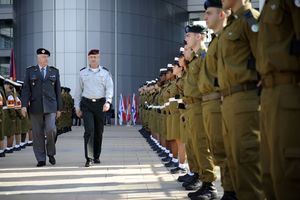
The First Zionist Congress was held in Basel in 1897, and 15 out of a total of 22 congresses were held in Switzerland. Before the establishment of the State of Israel, Switzerland maintained a consulate in Jerusalem and a consular agency in Tel Aviv. It recognized the new state in 1949 and opened a consulate in Tel Aviv, which was upgraded to an embassy in 1958. The Swiss community in Israel is the largest in the Asian region, totalling around 12,000 persons.[127]
After escalation of the Middle East conflict, Switzerland halted arms sales and military cooperation with Israel from 2002 to 2005. Since 2004, there has been regular political dialogue between Switzerland and Israel.[127]
Switzerland has represented Israel's interests in numerous countries (Hungary (1967–1989), Guinea (1967–1973), Ceylon/Sri Lanka (1970–1976), Madagascar (1973–1994), Liberia (1973–1983) and Ghana (1973–2002)). Conversely, it has represented the interests of Iran (1958–1987) and Côte d'Ivoire (1973–1986) in Israel. It also lobbied successfully for inclusion of Magen David Adom in the Red Cross and Red Crescent movement.[127]
On 21 April 2009, Israel recalled its ambassador for consultations due to events that occurred at the UN anti-racism conference in Geneva, Switzerland. Israeli officials, angered by a meeting between Swiss President Hans-Rudolf Merz and the Iranian president, recalled its ambassador to Switzerland, Ilan Elgar "for consultations" amid ongoing controversy over an anti-racism conference being held in Geneva.[128][129]
Ukraine
United Kingdom
Since its recognized independence in 1948, the United Kingdom and Israel have shared cordial and strongly strategic relations; the two nations share interests in the fields of political cooperation, immigration (seeing as many British Jews migrate to Israel) and economic trade[بحاجة لمصدر]. However, relations between the two countries began as hostile. During the 1948 Arab-Israeli war, Britain detained 8,000 Jewish men of military age attempting to make aliyah to Israel in Cyprus, so they could not participate in the fighting. Britain supplied weapons to the Arab states, and almost went to war with Israel. When Israel captured the Negev, the British Ministry of Defence began to draw up plans for a possible invasion of Israel. British planes spied on Israeli positions, and war between the two countries became even more possible when four British planes were shot down by Israel. However, the two countries began to soften later on, and trade began. This was confirmed in 1956 when Israel effectively allied with France and the UK to invade Suez. Nevertheless, Anglo-Israeli relations became turbulent in the summer of 2006 when Prime Minister Tony Blair, along with many other European leaders criticized IDF airstrikes against Hezbollah targets in Lebanon, which had high civilian casualties. During the current Cameron premiership, relations between the two countries continue to remain close.
North America
Canada
Canada's relationship with Israel began in 1947, when Canada was represented on the United Nations Special Committee on Palestine (UNSCOP). Canada was one of the 33 countries (including only four Commonwealth members) that voted in favour of the 1947 UN partition resolution that lead to the creation of the State of Israel, thus beginning a longstanding relationship with the Jewish state based on a shared commitment to democratic values, understanding, and mutual respect.
Mexico
Mexico and Israel have had diplomatic relations since January 1950. Throughout the years, they have maintained close relations with each other. In 2000, a free trade agreement was signed between the two nations. Mexico has also purchased weapons from Israel and it's one of Israel's closest allies in North America.[130]
United States
The relations between Israel and the United States have evolved from an initial United States policy of sympathy and support for the creation of a Jewish state in 1948 (It was the first country to recognize the establishment of the State) to an unusual partnership that links Israel with the United States trying to balance competing interests in the Middle East region. The United States has been considered Israel's most powerful and supportive ally and hosts the annual Salute to Israel Parade in New York City.
The United States is Israel's largest trading partner, accounting for 22.4 percent of Israel's $43.19 billion in imports, and 42.1 percent of Israel's $40.14 billion in exports annually (2005).[131] The U.S. also provides Israel with $2.4 billion in military assistance annually, which is equivalent to 24.5 percent of Israel's military expenditures. (2005).[131]
Oceania
Australia
Australia was one of the four Commonwealth nations to vote in favour of the 1947 UN partition resolution. Australia and Israel established full diplomatic relations in January 1949.[132] Australia has an embassy in Tel Aviv and Israel likewise in Canberra. There are 104,000 Jews living in Australia. In May 2010, the Australian government expelled an Israeli diplomat over the misuse of Australian passports in the assassination of Mahmoud Al-Mabhouh, which Foreign Minister Stephen Smith said was "not the act of a friend."[133]
Marshall Islands
The Marshall Islands is one of the most consistent supporters of Israel international affairs, along with the United States, Micronesia and Palau. The Marshall Islands is a country in free association with the United States, and thus consistently vote in favor of the United States.
Micronesia
The Federated States of Micronesia is one of the most consistent supporters of Israel. Throughout the history of the United Nations General Assembly, there has always been an "automatic majority" against Israel. The United States has often voted in favour of Israel and in recent years,[134][135] one other nation has joined Israel's defense – Micronesia.
The foreign policy goals of the Micronesia are primarily linked to achieving economic development and protecting their vast marine environment. Israel was one of the first to welcome Micronesia into the family of nations, even before it became a member of the UN. According to Micronesia's U.N. deputy ambassador, the country has since sought close bilateral relations with Israel in areas such as agriculture, technical training and health care training. Israel assisted Micronesia in its early development. As one Micronesian diplomat said, "We need Israeli expertise, so I don’t see a change in our policy anytime soon."[136]
In January 2010, the President of the Federated States of Micronesia, Emanuel Mori, and the President of the Republic of Nauru, Marcus Stephen, with their foreign ministers, visited Israel to expand ties on issues such as healthcare, solar energy, water conservation, clean technologies and other areas in which Israel can provide expertise. They met with Israeli leaders including the Prime Minister Benjamin Netanyahu, President Shimon Peres and Minister of Foreign Affairs Avigdor Lieberman.[137]
New Zealand
New Zealand was one of the four Commonwealth nations to vote in favour of the 1947 UN partition resolution. Since then, most New Zealand governments have been supportive of Israel. After 53 years of full diplomatic relations, the Israeli Embassy in Wellington closed in 2004 due to $5.4 million in cost-cuts by the Israeli Foreign Ministry. It was speculated that trade with Arab countries were a major factor. In June 2004, the New Zealand Government criticized Israel's policy of bulldozing Palestinian homes and donated $534,000 to aid homeless Palestinians. At one time there were four missions in the South Pacific area in Canberra, Sydney, Wellington and Suva in Fiji. Following the closure, only Canberra remained open, which was responsible for New Zealand-Israeli Relations. In 2009, the Israel Foreign Ministry announced the reopening of the embassy in Wellington.[75]
In mid-2004, two suspected Mossad agents were jailed for three months and paid a $35,000 fine for trying on false grounds to obtain a New Zealand passport. High-level visits between the two countries were cancelled, visa restrictions imposed for Israeli officials, and an expected visit to New Zealand by Israeli president Moshe Katsav was cancelled. More than a year later, Israel apologized and New Zealand Prime Minister Helen Clark announced that it was time to resume friendly diplomatic relations with Israel.
Palau
Palau is one of the most consistent supporters of Israel in the United Nations and other international affairs along with the United States, Micronesia and the Marshall Islands. In 2006, Palau had the highest voting coincidence with Israel in the United Nations.
Latin America
Argentina
In 1992, three Israeli diplomats were killed in the bombing of the Israeli Embassy which left 29 people dead and 240 wounded. Two years later, another bombing took place at the AMIA Jewish community center in Buenos Aires, killing 85 people and wounding 300. The investigation was never completed.[138] Néstor Kirchner called this a national disgrace, and reopened the files.
Bolivia
In January 2009, Bolivia limited its foreign relationship with Israel in the wake of strikes in Gaza by Israel. Bolivian President Evo Morales has reportedly promised to take Israel to an international court for alleged war crimes committed in Gaza.[139]
Brazil
In 2009, the Israel Foreign Ministry announced the reopening of the Israeli consulate in Sao Paulo, Brazil.[75] Although Juscelino Kubitschek, President of Brazil between 1956 and 1961, visited Israel after his tenure, Luiz Inácio Lula da Silva was the first Brazilian president to visit Israel while in office, in 2010.
Chile
Chile recognized Israel’s independence in February 1949. Israel sent its first ambassador to Chile in May 1950, and Chile sent its first ambassador Israel in June 1952. Prime minister Golda Meir visited Chile during her term in office. In March 2005, the Chilean minister of foreign affairs Ignacio Walker made an official visit to Israel. Chile is home to the largest Palestinian community outside the Middle East. Roughly 500,000 Palestinian descendants are believed to reside in Chile.[140][141]
Colombia
Colombia and Israel established formal relations in the mid-1950s. In recent years, Colombia has purchased planes, drones, weapons and intelligence systems from Israel. An Israeli company, Global CST won a $10 million contract in Colombia.[142]
Costa Rica
Costa Rica was one of the first countries to vote in favor of the establishment of the State of Israel. It maintained its embassy in Jerusalem until August 2006, when it finally relocated to Tel Aviv in order to bolster its ties with the Arab world.[143] In December 2011, Rodrigo Carreras became the Costa Rican ambassador to Israel for the second time, after his posting there in the 1980s. Carreras' father, Benjamin Nunez, also served as the Costa Rican ambassador to Israel.[144]
Cuba
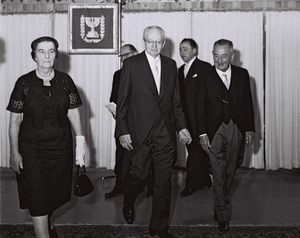
Cuba broke relations with Israel in 1973. In late 2010, Fidel Castro, who no longer holds office in Cuba's government, stated that he believes Israel has a 'right to exist', which is a shift from his regime's earlier policy.[145]
Haiti
Haiti and Israel maintain full diplomatic relations. In 1947, Haiti voted for the UN Partition Plan and the creation of the State of Israel.[146] Israel was among the first to send both personnel and aid to Haiti following the devastating earthquake in 2010.[147]
Nicaragua
On 2 June 2010 Nicaragua suspended diplomatic ties with Israel in response to the Gaza flotilla raid.[23]
Panama
Panama formally recognized the State of Israel on 18 June 1948. The two countries first exchanged in 1960.
Peru
Israel and Peru established diplomatic relations in 1957. In 1998 the two countries began talks on a free-trade agreement.[148] Israel sent rescue teams and medical aid to Peru after earthquakes in 1970, 2005 and 2007.[149][150] In 2001, Eliane Karp, a former Israeli, became the First Lady of Peru.[151]
Uruguay
Israel has an embassy in Montevideo. Uruguay has an embassy in Tel Aviv and 2 honorary consulates in Ashdod and Haifa. Uruguay was one of the first nations to recognise Israel as independent.
Venezuela
Relations were once strong, but the bilateral ties have soured under the Presidency of Hugo Chávez in Venezuela.[152] The Jewish population in Venezuela, which peaked at 45,000,[153] is now below 15,000 "as a result of severe instability in the country", according to the Israeli Stephen Roth Institute.[154] The Miami Herald, Jewish Times, and Jewish organizations have reported large-scale emigration of Jewish people from Venezuela during the Chávez administration.[155][156] As a result of the June/July 2006 battles in the Gaza Strip, Venezuela withdrew its ambassador to Israel. The embassy itself remains open and operational[157][التحقق مطلوب]Following the Israeli attack on Gaza in December 2008 and January 2009, Venezuela cut its diplomatic ties with Israel. Venezuelan president Hugo Chávez called the attack "genocidal", and urged that Israeli Prime Minister Ehud Olmert be tried for war crimes.
Israeli foreign aid
Israeli foreign aid ranks very low among OECD nations, spending less than 0.1% of its GNI on foreign aid. Individual international charitable donations are also very low, with only 0.1% of charitable donations being sent to foreign causes.[158]
Israel has provided humanitarian assistance to developing countries in Asia, Africa, South America, Oceania, and Central Europe through the activities of Mashav,[159] the Israeli Center for International Cooperation, created in 1958, with the goal to give developing countries the knowledge, tools, and expertise that Israel gained in its own development, and its ability to "make the desert flourish". This center trains course participants from approximately 140 countries on healthcare, as well as emergency and disaster medicine, and has participated in dozens of projects worldwide in fields economic fields such as agriculture, education, development, employment, and healthcare, as well as humanitarian fields such as disaster relief, reconstruction, and refugee absorption.[160]
In the 1970s, Israel broadened its aid agenda by granting safe haven to refugees and foreign nationals in distress from around the world. Since the 1980s, Israel has also provided humanitarian aid to places affected by natural disasters and terrorist attacks. In 1995, the Israeli Foreign Ministry and Israel Defense Forces established a permanent humanitarian and emergency aid unit, which has carried out humanitarian operations worldwide.[161] As well as providing humanitarian supplies, Israel has also sent rescue teams and medical personnel and set up mobile field hospitals in disaster-stricken areas worldwide.
انظر أيضاً
وصلات خارجية
- Official website of the Israel Ministry of Foreign Affairs
- Recognize Israel, Initiative for international diplomatic relations with Israel
- Deciding the Fate of the Territories Occupied During the Six Day War: An Ongoing Debate
The Government Discusses Israel's Peace Plan, 18–19 June 1967:
- Israel's relations with the Third World and Africa, reports by Tel Aviv University and The Africa Institute American Jewish Committee
الهامش
- ^ Government, International Organizations (countriesquest.com)
- ^ Daniel Bar-Elli. "Biennial Report 2006-2007" (PDF). Israeli National Commission for UNESCO. Retrieved 2010-07-20.
- ^ "תפקידי הוועד הישראלי לאונסקו" (in Hebrew). Israeli National Commission for UNESCO. Retrieved 2010-07-20.
{{cite web}}: Unknown parameter|trans_title=ignored (|trans-title=suggested) (help)CS1 maint: unrecognized language (link) - ^ "האיחוד האירופי" (in Hebrew). Israeli Ministry of Science & Technology. Retrieved 2010-07-20.
{{cite web}}: Unknown parameter|trans_title=ignored (|trans-title=suggested) (help)CS1 maint: unrecognized language (link) - ^ "CERN – The European Organization for Nuclear Research" (in Hebrew). Israeli Ministry of Science & Technology. Retrieved 2010-07-20.
{{cite web}}: CS1 maint: unrecognized language (link) - ^ "אירגונים בינלאומיים" (in Hebrew). Israeli Ministry of Science & Technology. Retrieved 2010-07-20.
{{cite web}}: Unknown parameter|trans_title=ignored (|trans-title=suggested) (help)CS1 maint: unrecognized language (link) - ^ Bank for International Settlement – profilePDF (23.9 KB)
- ^ "Accession: Estonia, Israel and Slovenia invited to join OECD". OECD. Retrieved 2010-05-10.
- ^ "NATO Topics: NATO's Mediterranean Dialogue – Linking regions together". Retrieved 2010-07-20.
- ^ ماتي زوهار. "الدول التي تقيم علاقات دبلوماسية مع اسرائيل". جريدة البلاغ الصحفي.
- ^ United States Congress (5 June 2008). "H. RES. 1249" (PDF). Since the publication of this document, Maldives has recognized Israel.
- ^ أ ب قطر، Mauritania cut Israel ties Al Jazeera. Date: Friday, 16 January 2009
- ^ أ ب خطأ استشهاد: وسم
<ref>غير صحيح؛ لا نص تم توفيره للمراجع المسماةmfa.gov.il - ^ Israel signs condolence book to Algeria bombing victims despite no diplomatic relations – AP Worldstream | Encyclopedia.com[dead link]
- ^ "Libya Complains of Israeli High Sea 'Piracy' to UN Council". CommonDreams.org.
- ^ American Universities Field Staff (1966). AUFS reports: Northeast Africa series. p. 5: "Somalia does not recognise Israel, and generally sides with the Arab cause in the Near Eastern controversy."
- ^ Dizard, Wilson. "Columbus Council on World Affairs Welcomes President Ahmed". The Somali Link. Somalilink.com. Retrieved 2011-04-04.
- ^ Itamar Rabinovich (2008). Israel in the Middle East: documents and readings on society, politics, and foreign relations, pre-1948 to the present. UPNE. p. 200. ISBN 978-0-87451-962-4.
- ^ أ ب ت ث ج ح خ د ذ ر "'Reply' Online Book Chapter 1". Mythsandfacts.org.
- ^ "Reuters". Reuters.
- ^ enduring alliance with the Palestine Liberation Organization.
- ^ "Nicaragua suspends diplomatic ties with Israel". Xinhua News Agency. 2 June 2010.
- ^ أ ب "Nicaragua suspends diplomatic ties with Israel – Israel News, Ynetnews". Ynet. 2 June 2020. Retrieved 7 September 2010.
- ^ "Reuters". Reuters. 14 January 2009.
- ^ non-Muslim country, enduring alliance with the Palestine Liberation Organization.
- ^ أ ب Haggard, M (1965). "North Korea's International Position". Asian Survey. California, United States: University of California Press. 5 (8): 375–388. doi:10.2307/2642410. ISSN 0004-4687. OCLC 48536955. خطأ استشهاد: وسم
<ref>غير صالح؛ الاسم "Haggard" معرف أكثر من مرة بمحتويات مختلفة. - ^ Iran Says Israel Stops Its Aid Ship To Gaza – Radio Free Europe / Radio Liberty © 2009, Iran recognised Israel and had ties with it prior to the 1979 Islamic Revolution.
- ^ "Bill Presses Iraq To Recognize Israel –". Forward.com.
- ^ Roee Nahmias (09 04 08). "Assad: We won't recognize Israel". Ynetnews.
{{cite news}}: Check date values in:|date=(help) - ^ "United Arab Emirates – Foreign Relations". Countrystudies.us.
- ^ Bhutan Bilateral relations Bhutan Ministry of Foreign Affairs website and Bhutan and Spain establish diplomatic relations Bhutan Ministry of Foreign Affairs website, 11 February 2011
- ^ Staff writers (9 January 2006). "Kabul will forge Israel ties if Palestinians form State: Karzai". Pak Tribune. Pakistan News Service. Retrieved 2011-08-05.
- ^ أ ب "Israeli troops shoot Hezbollah militants". CNN. Retrieved 2010-05-02.
- ^ Israel alarm at UN force members, BBC
- ^ خطأ استشهاد: وسم
<ref>غير صحيح؛ لا نص تم توفيره للمراجع المسماةarchives1973 - ^ Israel makes every drop count
- ^ خطأ استشهاد: وسم
<ref>غير صحيح؛ لا نص تم توفيره للمراجع المسماةMFA-Africa - ^ Togo-Israel cooperation pact
- ^ أ ب Azoulay, Yuval (5 February 2010). "Israeli professor helps solve food crisis spawned by Nile perch". Haaretz.
- ^ "Zimbabwe: Israel to sell heavy riot control vehicles to Mugabe government". Southern African Documentation and Cooperation Centre Dokumentations. Retrieved 2007-12-12.
- ^ أ ب ت ث Shalizi, Hamid. "Afghans sign up to fight Israel". Reuters.
- ^ "Embassy of Israel – Yangon. Bilateral Relations: Relations Overview". Yangon.mfa.gov.il. 26 March 2012.
- ^ File:UNu-Dayan.jpg
- ^ David Isenberg (4 December 2002). "Israel's role in China's new warplane". Asia Times.
- ^ Watson, Roland; Elliott, Francis; Coates, Sam (11 June 2006). "China's hi-tech military disaster". The Times. London.[dead link]
- ^ Wu, Vicky (16 March 2009). "Israel's image in China". The Jerusalem Post.
- ^ Helen Kaye (21 May 2007). "China celebrates". The Jerusalem Post.
- ^ India and Israel: Dawn of a New Era قالب:WebCite
- ^ "U.S. and India Consider 'Asian NATO'". Newsmax.com. 29 May 2003.
- ^ "ישראל הפכה ליצואנית הנשק המובילה להודו". Ynet.co.il. 20 June 1995.
- ^ "India replaces Korea as top Asian market for Israel". World Tourism Directory.
- ^ Boudreaux, Richard (29 November 2008). "Israel has 'no doubt' citizens were targeted". Los Angeles Times. Retrieved 2010-05-02.
- ^ "From India with love". Ynet.co.il. 20 June 1995.
- ^ "World Snap – Today's News of India". News.worldsnap.com. 13 December 2010.
- ^ "Trainer Jets for Israel: Skyhawk Scandal Leads to End of an Era". Defenseindustrydaily.com. 16 January 2013.
- ^ Ahren, Raphael (6 July 2012). "Indonesia to informally upgrade its relations with Israel via ambassador-ranked diplomat in Ramallah". The Times of Israel.
- ^ "Israel renews diplomatic ties with the Maldives, a Muslim country". Ennaharonline.com.
- ^ Visit to Israel of Honorable Mrs. Sahana Pradhan, Minister for Foreign Affairs of Nepal Israel Ministry of Foreign Affairs
- ^ Abadi, Jacob. Israel's Quest for Recognition and Acceptance in Asia: Garrison State Diplomacy, 2004. Page 318.
- ^ Mary, New Orleans, Louisiana Mahmood, Lahore, Pakistan. "Pakistan K1 Visa Processing Times". K1-fiancee-visa-law.com.
{{cite web}}: CS1 maint: multiple names: authors list (link) - ^ "Canada Immigration Info' – FAQs, Info' available as answer for the question "Are some passports better to have than others?"". Canada-immigration-info.ca.
- ^ "Article". World Security Network. 12 December 1979.
- ^ "Bhutto wanted ties with Israel, sought Mossad protection". israel today.
- ^ "Pakistan biggest threat to Israel: Israeli FM – Thaindian News". Thaindian.com. 23 April 2009.
- ^ "UN General Assembly Resolution 181". Mfa.gov.il.
- ^ "Stock estimate of overseas filipinos" (PDF).
- ^ "Catholic News". American Catholic.
- ^ "The Israeli Government's Official Website, by the Ministry of Foreign Affairs". Singapore.mfa.gov.il. 26 March 2012.
- ^ أ ب Israeli Ministry of Foreign Affairs. Retrieved 4 May 2010
- ^ RoK Ministry of Foreign Affairs and Trade. Retrieved 4 May 2010
- ^ "S. Korea, Israel ink US$150 mln venture fund deal" (in (كورية)). English.yonhapnews.co.kr. 23 August 2010.
{{cite web}}: CS1 maint: unrecognized language (link) - ^ Israeli agriculture minister visits Sri Lanka[dead link]
- ^ Schechter, Asher (5 December 2010). "Israelis ignoring Bangkok travel warning – for now,". English.themarker.com.
- ^ "The Virtual Jewish History Tour: Thailand". Jewishvirtuallibrary.org.
- ^ أ ب ت Keinon, Herb (21 May 2009). "Foreign Ministry: New embassy in Turkmenistan, consulate in Sao Paulo, reopening of NZ embassy". The Jerusalem Post.
- ^ "VIETNAM-ISRAEL RELATIONS – Vietnamese Ministry of Foreign Affairs". Mofa.gov.vn.
- ^ "Vietnamese embassy to open in Israel for the first time" – Israeli Foreign Ministry
- ^ "Relations: Relations Overview – Israeli Embassy in Hanoi". Hanoi.mfa.gov.il. 26 March 2012.
- ^ "Albania and Israel in Accord To Establish Diplomatic Ties". The New York Times. 20 August 1991.
- ^ Advocates on Behalf of Jews in Russia, Ukraine, the Baltic States, and Eurasia: Armenia and Jews[dead link]
- ^ "Austrian embassy in Tel Aviv". Bmeia.gv.at.
- ^ "Israeli embassy in Vienna (in German only)". Vienna.mfa.gov.il. 26 March 2012.
- ^ "www.bmeia.gv.at". bmeia.gv.at.
- ^ "The Virtual Jewish History Tour – Azerbaijan". Jewishvirtuallibrary.org.
- ^ "Президентът на Държавата Израел Шимон Перес благодари на българската еврейска общност". Shalompr.org.
- ^ [1][dead link]
- ^ "The Virtual Jewish History Tour: Cyprus". Jewishvirtuallibrary.org.
- ^ "Getting friendly". The Economist. 18 February 2012. Retrieved 23 August 2012.
- ^ http://www.jstor.org/discover/10.2307/41145604?uid=3737848&uid=2129&uid=2&uid=70&uid=4&sid=21101849387571
- ^ "Czech pilots train in Israel for Afghan mission – ČeskéNoviny.cz". Ceskenoviny.cz.
- ^ أ ب Finland’s trade relations with Israel get a new boost
- ^ Jay Cristol. "History of Israel-France Relations". Hnn.us.
- ^ CIA: Special Assessments on the Middle East Situation, Page 1, 29 June 1967 CIA FOIA Document Page Viewer
- ^ "Israel – Western Europe". Countrystudies.us.
- ^ Around 2,000 French Jews to move to Israel this year AFP
- ^ أ ب ت Arnaud de Borchgrave (4 September 2008). "Israel of the Caucasus?". The Washington Times.
- ^ "Israel's foreign relations. The Israel-German special relationship". Britain Israel Communications and Research Centre. 23 November 2005. Archived from the original on 28 September 2007. Retrieved 2006-08-18.
- ^ "Germany and Israel". Background Papers. German Embassy. Archived from the original on 27 September 2007.
- ^ Israel welcomes new Germany to a celebration of its 60th birthday قالب:WebCite
- ^ "Greek-Israel Relations". Jewishvirtuallibrary.org.
- ^ Israel woos Greece after rift with Turkey BBC, 16 October 2010
- ^ Pfeffer, Anshel (12 December 2011). "Israel hosts Greek Air Force for joint exercise". Haaretz.
- ^ "Turkey, Greece discuss exploration off Cyprus". Haaretz. Associated Press. 26 September 2011. Retrieved 2012-01-01.
- ^ "Group proposes electricity link between Israel, Greece and Cyprus". Haaretz. Reuters. 30 January 2012. Retrieved 2012-01-30.
- ^ http://www.americanhellenic.org/news/2013-02-15.php
- ^ http://www.israelemb.org/washington/NewsAndEvents/Pages/Ambassador-hosts-congressional-Hellenic-Israel-caucus.aspx
- ^ http://usa.greekreporter.com/2013/02/15/new-greek-israeli-committee-in-u-s-congress/
- ^ http://www.timesofisrael.com/israels-us-envoy-hosts-meeting-on-israeli-greek-cypriot-ties/
- ^ "Meeting of the Israel-Vatican Bilateral Commission held in Jerusalem 30-Apr-2009". Mfa.gov.il.
- ^ "Israel's Diplomatic Missions Abroad: Status of relations". Government of Israel. Retrieved 2006-11-01.
- ^ "Embassy of Israel, Dublin". Israeli Embassy, Dublin. Retrieved 2006-11-01.
- ^ "Irish Consulate and Embassy Information". Government of Ireland. Archived from the original on 28 October 2006. Retrieved 2006-11-01.
- ^ "Taoiseach condemns killing of 4 UN Observers in Southern Lebanon". Government of Ireland. 26 July 2006. Retrieved 2006-11-01.
- ^ "Flights protest targets Prestwick". BBC News. 30 July 2006. Retrieved 2006-11-01.
- ^ "The Virtual Jewish History Tour – Luxembourg". Jewishvirtuallibrary.org.
- ^ "Communiqué issued on 18 July 1977 by the Permanent Mission of Portugal to the United Nations". United Nations.
- ^ Recognition of Israel JSTOR – The American Journal of International Law, Vol. 4, No. 3, July 1948.
- ^ Israel slams Russia for arming Syria. 2 March 2007
- ^ Katz, Yaakov. "Barak signs military deal with Russia". The Jerusalem Post.
- ^ Press conference with FM Liberman in Belgrade, Israel Ministry of Foreign Affairs, 2009-09-16
- ^ Sources: Israel won't recognize Kosovo, for now, The Jerusalem Post, 2008-02-19
- ^ Eldar, Akiva (30 October 2007). "Border Control / The Spanish conquest – Haaretz – Israel News". Haaretz.
- ^ Haaretz Flash News[dead link]
- ^ Ahlmark, Per (1997). Det öppna såret : om massmord och medlöperi (in Swedish). Stockholm: Timbro. p. 195. ISBN 978-91-7566-326-5.
{{cite book}}: More than one of|author=and|last=specified (help)CS1 maint: unrecognized language (link) - ^ Ahlmark 1997, p. 196
- ^ "Anförande vid TCO kongressen" (PDF).
- ^ أ ب ت ""Bilateral relations between Switzerland and Israel", Federal Department of Foreign Affairs
- ^ Israel protests at racism talks, BBC News
- ^ Williams, Dan. "Israel recalls Switzerland envoy over racism parley". Reuters.
- ^ "Israel and Mexico Sign Free Trade Agreement". Mfa.gov.il.
- ^ أ ب U.S. Department of State (February 2007). "Background Note: Israel". Retrieved 20 July 2007.
- ^ Danny Ben-Moshe, Zohar Segev (2007). Israel, the Diaspora, and Jewish identity. Sussex Academic Press. p. 262. ISBN 978-1-84519-189-4. Retrieved 4 August 2011.
{{cite book}}: Unknown parameter|coauthors=ignored (|author=suggested) (help) - ^ "Rudd government to expel Israeli diplomat over forged passports used in Hamas hit". The Australian. 28 September 2012.
- ^ "junge Welt – die linke Tageszeitung. Nachrichten und Hintergründe". Junge Welt.
- ^ "junge Welt – die linke Tageszeitung. Nachrichten und Hintergründe". Junge Welt. 22 September 2003.
- ^ "Micronesia-Israel Relations, in: jewishvirtuallibrary.org". jewishvirtuallibrary.org. 7 September 1998.
- ^ Pacific nations, Israel expand ties (20 January 2010) in Israel 21c Innovation News Service. Retrieved 2010–01–20
- ^ Keinon, Herb (30 March 2011). "Israel, Argentina face crisis over alleged deal with Tehran". The Jerusalem Post.
- ^ Bolivia cuts Israel ties over Gaza 14 January 2009
- ^ "Chile: Palestinian refugees arrive to warm welcome". Adnkronos.com. 7 April 2003.
- ^ "500,000 descendientes de primera y segunda generación de palestinos en Chile". Laventana.casa.cult.cu.
- ^ Melman, Yossi (4 July 2008). "Colombia hostage rescue: the Israeli angle – Haaretz – Israel News". Haaretz.
- ^ "Costa Rica Opens Official Ties With 'State of Palestine'". Forward.com.
- ^ "Peres: Israel has fantastic respect for Egyptian president". Costaricanewssite.com.
- ^ "Fidel Castro reconoce el derecho de Israel a la existencia como un Estado judío | Cuba". El Mundo. Spain. 22 September 2010.
- ^ "Virtual history tour:Haiti". Jewishvirtuallibrary.org. 22 March 2010.
- ^ Israelnetz news site
- ^ "Israel, Peru Agree to Begin Talks on Starting Free Trade". Dow Jones in Wall Street Journal. 26 May 1998. Retrieved 2009-06-24.
- ^ "Israeli mission to aid Peru". Ynetnews. 20 June 1995.
- ^ "Israeli Humanitarian Relief Operations". Mfa.gov.il.
- ^ "Don't cry for me, Peru". Ynet. 2006. Retrieved 2009-06-24.
It's been only five years since Eliane Karp-Toledo, a former Israeli, became First Lady of Peru, but in that time period her life has changed completely.
- ^ "Venezuela 'to sever Israel ties'". BBC News. 9 August 2006.
- ^ Halvorssen, Thor. Hurricane Hugo. The Weekly Standard, 8 August 2005, Volume 010, Issue 44. Also available at LookSmart. Archive copy at the Internet Archive
- ^ Stephen Roth Institute. Annual Report 2004: Venezuela.. Retrieved 11 August 2006.
- ^ Berrios, Jerry. S. Fla. Venezuelans: Chavez incites anti-Semitism.[dead link] The Miami Herald (10 August 2006).
- ^ Jewish Federation of Palm Beach County. JCRC expresses concern with Venezuelan unrest.. Retrieved 11 August 2006.
- ^ Berman, Daphna (29 September 2006). "Irish embassy rejects call by academics for a boycott of Israel institutions". Haaretz.
- ^ http://articles.latimes.com/2013/jun/08/world/la-fg-israel-foreign-aid-20130609
- ^ The Israeli Government's Official Website, by the Ministry of Foreign Affairs[dead link]
- ^ see Dayan Yoni, Le Mashav – Centre de Coopération International Israélien, 118 p., 2006, available in Irice center for international studies in Paris 1 University and soon in Internet
- ^ Israeli Humanitarian Relief Operations – Israel Ministry of Foreign Affairs قالب:WebCite
- CS1 errors: unsupported parameter
- Articles with dead external links from February 2013
- Articles with dead external links from September 2011
- CS1 errors: redundant parameter
- Articles with dead external links from February 2010
- Articles with hatnote templates targeting a nonexistent page
- Articles with unsourced statements from March 2011
- Articles with unsourced statements from January 2010
- Articles with unsourced statements from August 2008
- مقالات بالمعرفة تحتاج تمحيص الحقائق from July 2007
- جميع الصفحات التي تحتاج تمحيص حقائق
- Pages with empty portal template
- Foreign relations of Israel

